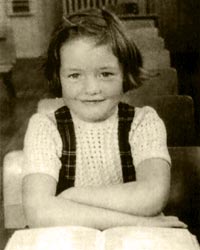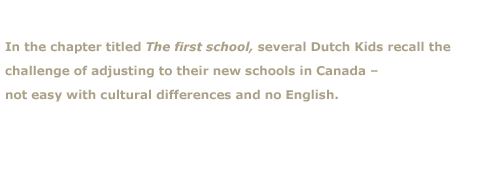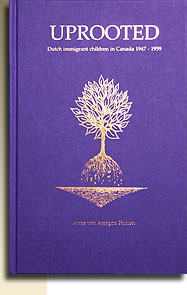


 |
|||
 |
|||
 |
 |
||
|---|---|---|---|
We did have instructions: walk until you come to a crossroad, then turn right and continue walking until you get to the school. For five youngsters walking in strange territory without knowing a word of English, it was an intimidating task. We walked and walked and walked, perhaps a mile to the crossroad. We turned right and walked some more, constantly on the lookout for the red brick building that we expected to see.
But when we finally saw a large brick building, it didn't look much like a school. After some discussion we kept on walking. And walking. Eventually we saw a small wood frame building with a few children playing outside. Ali and I thought it might be a school, especially since a faded old sign proclaimed "Amaranth District No. 9 School." That last word was the same in Dutch. Somehow Miss Flossie White managed to capture us and herd us inside. And so our schooling in Canada began.
At that, we were exceptionally lucky. Flossie White did whatever was in her power to help us settle in. She began by establishing what our names were, and quickly anglicized these. Not having any way of knowing our proper grade level, she assigned us a page of arithmetic problems. The first sheet she gave me was far too easy; I tore through the sums in record time. She then gave me harder problems to do, and thus established the level I could handle. I was in Grade Four, where I belonged, from the first day.
Grateful for Flossie White's kindness, we tried to reciprocate. Hampered by communication difficulties we consulted the Dutch/English, English/Dutch dictionary she had obtained, and offered to "broom de floor" for her. We used that book a lot, in fact, and sometimes chose a secondary meaning of a word that would make no sense whatsoever in the context we gave it. Despite the teacher's best efforts we were a people apart. During the cold weather other children would bring a can of soup and heat it on the school's small hot plate. We could only watch hungrily, then go back to our bread and jam. Lunchtimes were a peculiar affair at the best of times, as Ali remembers all too well.
"We sat on one side of the basement, and the other kids on the other side. We prayed before eating and found it so strange that they did not," she notes.
Margie ten Klooster and her sisters felt similarly left out when the other children each brought one potato to school. They had not understood the request, and watched hungrily as the others ate their now-boiled potato on a cold winter day. "We were just ignored and told 'no,' because we did not bring a potato for the pot," recalls Margie.
Nor did Ontario's harsh winter make life easy for us. The roads were not plowed, and we learned to plod across thick snowdrifts in our klompen – wooden shoes – or rubber boots. On lucky days we'd catch a ride with a farmer bringing his own children to school, but only for the last mile of the long walk. He'd stop just long enough for us to climb on to the sleigh before urging his horses on. There'd be as many as a dozen children on board by the time he arrived at school, and it was not unusual for us children to push each other off. I remember one such occasion when I had to run quite a long time to catch up with the sleigh again.
Then there was the question of becoming a Canadian, a process that took decades (or failed to happen at all.)